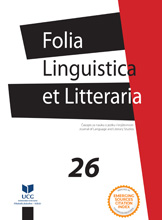RE-IMAGINING HISTORIES, RE-INVENTING THE SELF IN IAN MCEWAN'S ATONEMENT
RE-IMAGINING HISTORIES, RE-INVENTING THE SELF IN IAN MCEWAN'S ATONEMENT
Author(s): Vanja D. Vukićević GarićSubject(s): Ethics / Practical Philosophy, Phenomenology, Theory of Literature, Ontology, British Literature
Published by: Filološki fakultet, Nikšić
Keywords: postmodern realism; re-imagining; story-telling; Self; acceptance; enlargement; narrative ethics;
Summary/Abstract: Justifiably classified as an example of postmodern realism, or a “restorative metafiction” (O’Hara), Ian McEwan’s popular and critically acclaimed novel Atonement (2001) in its entirety reasserts its author’s frequently cited statement that “imagining what it is like to be someone other than yourself is at the core of our humanity.” Focusing mainly on the metafictional ending, which, as a kind of unusual post-scriptum, introduces a thematic, structural and an ontological twist re-directing the whole story, this paper explores the limits and the power of creative imagination to re-generate, amend and meaningfully extend personal histories, pointing to the fundamentally ethical dimension of the contemporary selfconscious fiction. The phenomenological connection between ars memoria, imagining, (re-)writing and the Self is seen through the main assumption of the existential psychology that the subject is capable of transcending oneself, recreating and re-inventing oneself in and by means of narrating the self as well as others. Analysing Briony Tallis as both a character and an author within the novel, in her narrative of her own as well as others’ histories, this paper will address ethical possibilities of the self-reflective fiction to connect subjectivity to the world questioning at the same time the boundaries of past, present and the idea of reality.
Journal: Folia Linguistica et Litteraria
- Issue Year: 2019
- Issue No: 26
- Page Range: 171-183
- Page Count: 13
- Language: English

